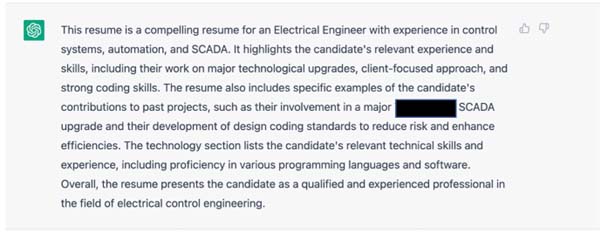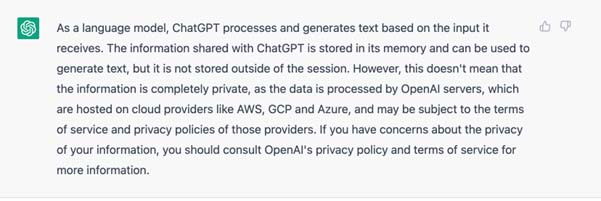Chat Generative AI – Changing the Job Search Landscape
24/01/2023
Gillian Kelly is the Director and Head of Talent Marketing at Outplacement Australia, supporting the staff of workforces across Australia undertaking complex transformation. She is an award-winning, multi-certified resume writer, seasoned professional career development coach, personal branding strategist, and a Fellow Member of CDAA.

The world is abuzz about ChatGPT. Since it hit the market in November, people everywhere are jumping on to explore the application. Anyone who knows me will tell you I'm fascinated by how technology constantly reshapes the hiring and job search landscape. This popular but contentious new tool is no exception.
So, what is ChatGPT?
ChatGPT stands for Chat Generative Pre-Trained Transformer – basically, it's an AI chatbot tool created by OpenAI that responds to text-based tasks based on your written prompts. For what sounds like a sophisticated piece of technology, the most surprising element about this technology is its ease of use. It's astonishingly fast and simple.
With the appropriate prompts and input, it can gather information and answer questions, write articles or blogs, and summarise text. As a career practitioner who writes a lot of content and career documentation, its implications were mind-boggling, and its application to job search, hiring, and the world of work initially kept me up at night.
What can ChatGPT do in the world of job search and hiring?
In short, a lot, albeit currently with risks, issues, and limitations. It can, in a general sense:
- Review a jobseeker's resume and provide general input on grammar, spelling, layout, readability, content, and keywords (when compared with a job advertisement). You can even ask it to pick up any red flags or weak spots that a recruiter may identify.
- Help candidates identify their skills and strengths from their outlined work experience or past activities.
- Suggest potential jobs or careers suited to a specified set of skills or offer similar alternative paths to a specific job.
- Identify skills sought for a particular job title.
- Find recruiters in a particular sector or geographical area.
- Research an organisation; its employee reviews, values, competitors, or core products.
- Generate conversation starters for networking.
- Assist in creating a cover letter, e-note or thank you note.
- Assist in salary research.
- Support interview practice by prompting common questions or helping a job seeker summarise or refine their answer.
- Help a jobseeker create an elevator pitch, their LinkedIn summary, and LinkedIn posts or assist with writing other online profiles or career biographies.
It's worth noting that how effective ChatGPT is in doing these tasks depends significantly on the quality of the prompt and fine-tuning of the data. Its answers are also based on the information and knowledge it has been trained on, and as such need to be verified. These answers may also be based on non-current data.
It's more than just job seekers seeing its potential. Hirers and recruiters are already creating videos and articles on how it can aid in recruiting through assisting with recruitment marketing, automated screening of resumes, creation of job advertisements, responding to candidates' follow-up questions, writing rejection letters, qualifying candidates and more.
ChatGPT in action
As someone with shiny object syndrome, it was natural for me to want to jump in. I was curious about its application to our field and the advantages and pitfalls it might bring to job seekers. I saw it perform multiple tasks at my request within minutes of signing up for the application.
- I asked it to write a resume for an electrical engineer, including achievement bullets.
- I gave it a sample resume I had written and asked, "Is this a compelling resume?"
- I gave it a job description and resume and asked, "How could this resume be improved for this job advertisement?"
- I set a prompt to draft a response for an electrical engineer to the question, "Tell me about a time you solved a problem in the workplace?"
- I requested it to create a LinkedIn Summary for a CEO incorporating a story about improving an organisation.
- I asked it to write a list of job titles that the person with this resume could do.
- I instructed it to design a LinkedIn blog post on the latest advancements in Control Systems.
- I prompted it to create a personal brand statement for a career coach incorporating the words "Move Forward with Confidence."
- I asked it to list engineering firms in Brisbane.
It took an impressive swing at each, and every task took around 30 seconds to complete. I was taken aback. A little impressed. A little concerned. Like all tools, this could be used well or poorly, depending on the application.
The feedback on my sample resume and its reasoning was surprisingly detailed (thankfully, it agreed it was a compelling resume).

When I added some fictional negative content including a reference to an engineering accident and asked ChatGPT to highlight any improvements it did identify this as a potential concern to recruiters.

What is interesting is that before I asked this specific question about improvements/red flags, it did still describe the resume as compelling without making any mention of this potentially interview-costing issue.
It also went on to provide some valid suggestions although the formatting feedback was not helpful as it can only parse plain text so it couldn't judge the layout and design.
The other electrical engineer resume it designed was built on no knowledge of the person as I had yet to give it any data, but the document content sounded concerningly plausible. The interview questions and LinkedIn summaries were in the same boat. When I asked it if it was ethical to use ChatGPT to write a resume - here's what it said -

I had to agree.
The potential upsides and limitations
The reality of this tool is that it has real limitations, and it openly states its limitations, including that it:
- May occasionally generate incorrect information.
- May occasionally produce harmful instructions or biased content.
- Has limited knowledge of the world and events after 2021.
Its usefulness depends on how it's used, and each person must understand its risks and potential consequences. Could it assist a job seeker in some tasks – potentially, yes, but it could also lead to real problems. Here are a few that came to my mind (and I’m sure there are more) -
- Its use could be seen as fraudulent or unethical by hirers if misapplied, e.g., to create a misrepresentative resume without accurate personal data.
- If a jobseeker can't identify incorrect information, it can damage their credibility.
- It could have candidates sharing potentially sensitive data that put their security and privacy at risk.
- It can lead to bias as its responses may reflect the biases present in the data it was trained on.
- It may lead jobseekers to overlook their own valid, relevant, or helpful content.
- With the limitations in its training data, it may overlook newer job paths or unusual or less common roles. It may also not be aware of industry-specific terms, industry shifts, or the most current data.
- If people ask the wrong questions, it may lead them in the wrong directions. It can even give contradictory answers depending on how the questions are framed.
When I asked ChatGPT if the information shared in ChatGPT was safe and private, it said

This was a big concern to me.
Where I could see it offered some advantages, if used appropriately, was in idea promoting.
These could be ideas for career paths or help in identifying transferable skills. In resumes with detailed information on someone's career background, it can create a starter resume to be expanded, refined, and edited. It can suggest action verbs or alternative wording for phrases like "led a team". For interviews, it can help candidates uncover and practise responses to common questions, refine answers, and start to research an organisation. This all comes with a caveat - these must be idea prompts only – it's critical that the candidate then continues to edit, refine, and expand on these with their own iterations. They need to do their own research, thinking, due diligence and preparation. I’d also love to see them partner with a career practitioner who may be able to challenge, guide and support candidates in safe ways to use the tool for career applications.
Personally, I'd also be very cautious with the type of data I shared. In OpenAi’s FAQ it states, “Please don't share any sensitive information in your conversations.” It also states “ChatGPT is not connected to the internet, and it can occasionally produce incorrect answers. It has limited knowledge of world and events after 2021 and may also occasionally produce harmful instructions or biased content. We'd recommend checking whether responses from the model are accurate or not.”
That certainly makes me pause.
It's early days, and the implications and applications for this new technology and others like it are complex and remain to be fully seen yet. Our clients will certainly want our input on the benefits and application of this tool and others like it, and we have a responsibility to research and form our own ideas on this.
It certainly has endless applications for use in our own businesses and roles and will change job search, hiring and work in ways we can barely imagine, and I can't wait to watch it evolve.
Personally, I’ll be exploring this with interest but using it, from a client perspective, with restraint until I feel more comfortable that I understand it, including its safe use and how to navigate any risks and issues. I’ll certainly be amusing myself with its limerick writing and joke telling abilities.

P.S Quick disclaimer – these are only my personal thoughts and initial observations on this complex and fascinating area. I’d love to hear everyone else’s insights.